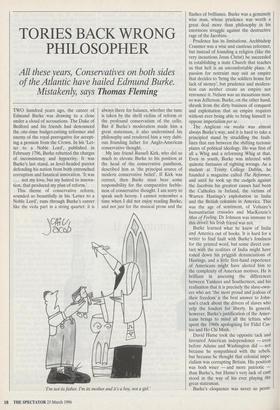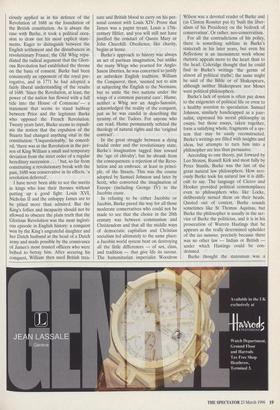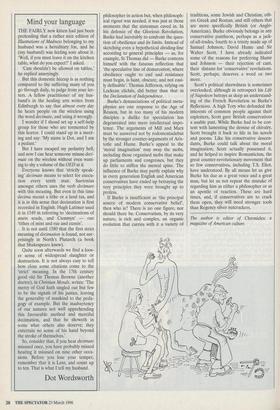TORIES BACK WRONG PHILOSOPHER
All these years, Conservatives on both sides of the Atlantic have hailed Edmund Burke.
Mistakenly, says Thomas Fleming TWO hundred years ago, the career of Edmund Burke was drawing to a close under a cloud of accusations. The Duke of Bedford and his friends had denounced the one-time budget-cutting reformer and enemy of the royal prerogative for accept- ing a pension from the Crown. In his 'Let- ter to a Noble Lord', published in February 1796, Burke rebutted the charges of inconsistency and hypocrisy. It was Burke's last stand, as level-headed patriot defending his nation from both entrenched corruption and fanatical innovation. 'It was . . . not my love, but my hatred to innova- tion, that produced my plan of reform.'
This theme of conservative reform, sounded so beautifully in his 'Letter to a Noble Lord', runs through Burke's career like the viola part in a string quartet: it is always there for balance, whether the tune is taken by the shrill violins of reform or the profound conservatism of the cello. But if Burke's moderation made him a great statesman, it also undermined his philosophy and rendered him a very dubi- ous founding father for Anglo-American conservative thought.
My late friend Russell Kirk, who did so much to elevate Burke to his position at the head of the conservative pantheon, described him as 'the principal source of modern conservative belief. If Kirk was correct, then Burke must bear some responsibility for the comparative feeble- ness of conservative thought. I am sorry to speak such heresy. I cannot remember a time when I did not enjoy reading Burke, and not just for the musical prose and the I'm not its father. I'm its mother and its a boy, not a girl.' flashes of brilliance. Burke was a genuinely wise man, whose prudence was worth a great deal more than philosophy in his enormous struggle against the destructive rage of the Jacobins.
Prudence has its limitations. Archbishop Cranmer was a wise and cautious reformer, but instead of founding a religion (like the very incautious Jesus Christ) he succeeded in establishing a state Church that teaches us that hell is an uncomfortable place. A passion for restraint may suit an empire that decides to 'bring the soldiers home for lack of money', but prudence and modera- tion can neither create an empire nor renounce it. Nelson was an incautious man; so was Jefferson. Burke, on the other hand, shrank from the dirty business of conquest and exploitation that an empire requires without ever being able to bring himself to oppose imperialism per se.
The Anglican via media was almost always Burke's way, and it is hard to take a principled stand by straddling the fault- lines that run between the shifting tectonic plates of political ideology. He was first of all a Whig and a reforming Whig at that. Even in youth, Burke was infected with quixotic fantasies of righting wrongs. As a student at Trinity College Dublin, he founded a magazine called The Reformer, and until he took up the cudgels against the Jacobins his greatest causes had been the Catholics in Ireland, the victims of Warren Hastings's exploitation in India and the British colonists in America. This was the age of sentiment, of Voltaire's humanitarian crusades and MacKenzie's Man of Feeling. Dr Johnson was immune to this drivel; his Irish friend was not.
Burke learned what he knew of India and America out of books. It is hard for a writer to find fault with Burke's fondness for the printed word, but some direct con- tact with the realities of India might have toned down his priggish denunciations of Hastings, and a little first-hand experience of Americans might have alerted him to the complexity of American motives. He is brilliant in assessing the differences between Yankees and Southerners, and his realisation that it is precisely the slave-own- ers who are 'the most proud and jealous of their freedom' is the best answer to John- son's crack about the drivers of slaves who yelp the loudest for liberty. In general, however, Burke's justification of the Amer- icans brings to mind all the leftists who spent the 1960s apologising for Fidel Cas- tro and Ho Chi Minh.
David Hume took the opposite tack and favoured American independence — even before Adams and Washington did — not because he sympathised with the rebels, but because he thought that colonial impe- rialism was corrupting Britain. His position was both wiser — and more patriotic than Burke's, but Hume's very lack of cant stood in the way of his ever playing the great statesman. Burke's eloquence was never so perni- ciously applied as in his defence of the Revolution of 1688 as the foundation of the British constitution. As is always the case with Burke, it took a political occa- sion to draw out his most explicit state- ments. Eager to distinguish between the English settlement and the disturbances in revolutionary France, the Old Whig repu- diated the radical argument that the Glori- ous Revolution had established the throne on the basis of consent. Burke had been consistently an opponent of the royal pre- rogative, and in 1771 he had adopted a fairly liberal understanding of the results of 1688: 'Since the Revolution, at least, the power of the nation has flowed with a full tide into the House of Commons' — a statement that seems to stand halfway between Price and the legitimist Burke who opposed the French Revolution. Twenty years later, Burke seems to repudi- ate the notion that the expulsion of the Stuarts had changed anything vital in the constitution: 'Unquestionably,' he conced- ed, 'there was at the Revolution in the per- son of King William a small and temporary deviation from the strict order of a regular hereditary succession . . . ' but, so far from constituting a revolutionary break with the past, 1688 was conservative in its effects, `a revolution deferred'.
I have never been able to see the merits in kings who lose their thrones without putting up a good fight: Louis XVI, Nicholas II and the unhappy James are to be pitied more than admired. But the King's follies and incapacity should not be allowed to obscure the plain truth that the Glorious Revolution was the most inglori- ous episode in English history: a conquest won by the King's ungrateful daughter and her Dutch husband at the head of a Dutch army and made possible by the connivance of James's most trusted officers who were bribed to betray him. After securing his conquest, William then used British trea- sure and British blood to carry on his per- sonal contest with Louis XIV. Prove that James was a papist tyrant, Louis a 17th- century Hitler, and you will still not have justified the conduct of Queen Mary or John Churchill. Obedience, like charity, begins at home.
Burke's approach to history was always an act of partisan imagination, but unlike the many Whigs who yearned for Anglo- Saxon liberties, he was concerned to justify an unbroken English tradition. William the Conqueror, then, 'seemed not to aim at subjecting the English to the Normans, but to unite the two nations under the wings of a common parental care'. Hume, neither a Whig nor an Anglo-Saxonist, acknowledged the reality of the conquest, just as he was candid in describing the tyranny of the Tudors. For anyone who can read, Hume permanently refuted the theology of natural rights and the 'original contract'.
In the great struggle between a dying feudal order and the revolutionary state, Burke's imagination tugged him toward the 'age of chivalry', but he shrank from the consequences: a rejection of the Revo- lution and an embrace, at least in princi- ple, of the Stuarts. This was the course adopted by Samuel Johnson and later by Scott, who converted the imagination of Europe (including George IV) to the Jacobite cause.
In refusing to be either Jacobite or Jacobin, Burke paved the way for all those moderate conservatives who could not be made to see that the choice in the 20th century was between communism and Christendom and that all the middle ways of democratic capitalism and Christian socialism led ultimately to the same place: a Jacobin world system bent on destroying all the little differences — of sex, class, and tradition — that give life its savour. The humanitarian imperialist Woodrow Wilson was a devoted reader of Burke and (as Clinton Rossiter put it) 'built the liber- alism of his Presidency on the bedrock of conservatism'. Or rather, neo-conservatism.
For all the contradictions of his policy, there is something sublime in Burke's statecraft in his later years, but even his Reflections is an inconsistent work whose rhetoric appeals more to the heart than to the head. Coleridge thought that he could find in Burke's writings 'the germs of almost all political truths'; the same might be said of the Bible or of Shakespeare, although neither Shakespeare nor Moses were political philosophers.
Burke's lack of system is often put down to the exigencies of political life or even to a healthy aversion to speculation. Samuel Johnson, similarly handicapped as a jour- nalist, expressed his moral philosophy in essays, but those essays, taken together, form a satisfying whole, fragments of a sys- tem that may be easily reconstructed. Burke's writings are filled with insights and ideas, but attempts to turn him into a philosopher are less than persuasive.
According to one theory, put forward by Leo Strauss, Russell Kirk and most fully by Peter Stanlis, Burke was the last of the great natural law philosophers. How seri- ously Burke took his natural law it is diffi- cult to say. The language of Cicero and Hooker provided political commonplaces even to philosophers who, like Locke, deliberately turned them on their heads. Quoted out of context, Burke sounds sometimes like St Thomas Aquinas, but Burke the philosopher is usually in the ser- vice of Burke the politician, and it is in his prosecution of Warren Hastings that he appears as the really determined upholder of the ius naturae, precisely because there was no other law — Indian or British under which Hastings could be con- demned.
Burke thought the statesman was a philosopher in action but, when philosoph- ical rigour was needed, it was just at those moments that the statesman caved in. In his defence of the Glorious Revolution, Burke had inevitably to confront the ques- tion of obedience and its limits. Instead of sketching even a hypothetical dividing-line according to general principles — as, for example, St Thomas did — Burke contents himself with the fatuous reflection that `the speculative line of demarcation, where obedience ought to end and resistance must begin, is faint, obscure, and not easi- ly definable'. Thomas Jefferson, relying on Lockean clichés, did better than that in the Declaration of Independence.
Burke's denunciations of political meta- physics are one response to the Age of Reason, but in too many of his modern disciples a dislike for speculation has degenerated into mere intellectual impo- tence. The arguments of Mill and Marx must be answered not by rodomontadebut by the stronger counter-arguments of Aris- totle and Hume. Burke's appeal to the `moral imagination' may sway the mobs, including those organised mobs that make up parliaments and congresses, but they do little to stiffen the mental spine. The influence of Burke may partly explain why in every generation English and American conservatives have ended up betraying the very principles they were brought up to profess.
If Burke is insufficient as 'the principal source of modern conservative belief, then who is? There is no one figure, nor should there be. Conservatism, by its very nature, is rich and complex, an organic evolution that carries with it a variety of traditions, some Jewish and Christian, oth- ers Greek and Roman, and still others that are more specifically British (or Anglo- American). Burke obviously belongs in any conservative pantheon, perhaps as a jack- of-all-trades, fourth to a trinity made up of Samuel Johnson, David Hume and Sir Walter Scott. I have already indicated some of the reasons for preferring Hume and Johnson — their rejection of cant, their distaste for 'conservative' revolutions. Scott, perhaps, deserves a word or two more.
Scott's political shrewdness is sometimes overlooked, although in retrospect his Life of Napoleon betrays as deep an understand- ing of the French Revolution as Burke's Reflections. A high Tory who defended the interests of common people against their exploiters, Scott gave British conservatives a usable past. While Burke had to be con- tent with lamenting the demise of chivalry, Scott brought it back to life in his novels and poems. Like his conservative descen- dants, Burke could talk about the moral imagination; Scott actually possessed it, and he helped to inspire Romanticism, the great counter-revolutionary movement that so few conservatives, including T.S. Eliot, have understood. By all means let us give Burke his due as a great voice and a great man, but let us not repeat the mistake of regarding him as either a philosopher or as an apostle of reaction. These are hard times, and, if conservatives are to crack them open, they will need stronger tools than Regency silver nutcrackers.
The author is editor of Chronicles: a magazine of American culture.




































































 Previous page
Previous page